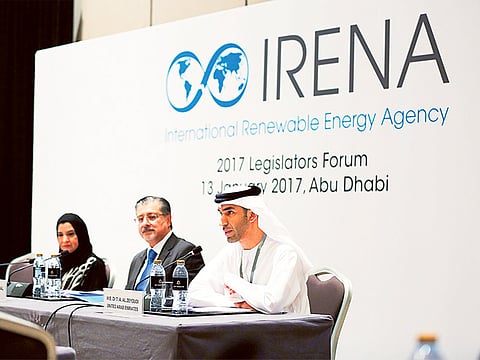UAE funds 100MW clean energy projects benefiting 1m
Latest Abu Dhabi Fund for Development and Irena facility funds $44.5m projects in four nations in the Pacific and Africa

Abu Dhabi: The UAE-funded 100MW (megawatt) clean energy projects in developing nations will benefit more than a million people, most of whom do not have access to electricity, a top official told Gulf News on Saturday.
The projects funded by Abu Dhabi Fund for Development (ADFD) and the International Renewable Energy Agency (Irena) are an innovative and efficient mechanism to offer energy access to people in developing countries, said Adnan Z. Ameen, director-general of Irena.
He was speaking on the sidelines of Irena’s seventh assembly that witnessed the announcement of $44.5-million (Dh163.32-million) in funds for four clean energy projects in the Pacific and Africa, identified by ADFD and Irena in their fourth round of funding.
The latest round of funding will support a 4.6MW project providing energy access to over 16,000 people in Marshall Islands, a rural electrification for over 150,000 people in Niger, a 5MW solar PV-wind farm project benefiting the entire population of 90,000 people in the Seychelles, and a 20MW hydropower facility providing renewable energy access to 5,000 people in Solomon Islands.
Mohammad Saif Al Suwaidi, director-general of ADFD, said: “Over seven funding cycles, our $350-million partnership, IRENA/ADFD Project Facility, aims to support and enhance the developing world’s energy needs by tapping into their abundant renewable energy sources. The UAE’s commitment to advancing sustainable energy transitions in countries around the world has been unwavering,” he said.
Through the Irena/ADFD Project Facility, ADFD provides concessional loans ranging from $5 million to $15 million per project. Finance is offered at one to two per cent lending rates with a 20-year loan period, including a five-year grace period. Loans for each project cover up to half of the estimated project cost, leveraging additional funding from other sources.
Latest four projects funded by ADFD
• Marshall Islands: A 4.6MW hybrid micro-grid project, using solar PV and advanced lithium-ion batteries, which will provide renewable energy access to over 16,000 people. It will essentially eliminate fossil fuel-based generation on three outer islands and reduce it by more than a third on a fourth island.
• Niger: A project focused on rural electrification for over 150,000 people, using 2.1MW solar PV micro-grids and solar home kits. 100 schools will be electrified, drinking water supplies improved, and several thousand jobs created.
• Seychelles: A government-supported solar PV utility scale project will integrate a 5MW solar PV plant into an existing wind farm, demonstrating an innovative space-saving solution for this small island nation. The project will reduce the country’s dependence on fossil fuels, create almost 300 jobs, and supply renewable power to over 1,800 households — benefiting the entire population of 90,000 people.
• Solomon Islands: A government-backed 20MW reservoir dam and hydropower facility will diversify the country’s energy mix, provide renewable energy access to 5,000 people, create around 400 jobs, and avoid 44,000 tonnes of CO2 emissions per year.



